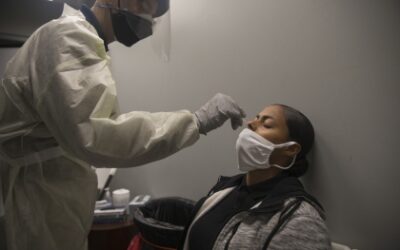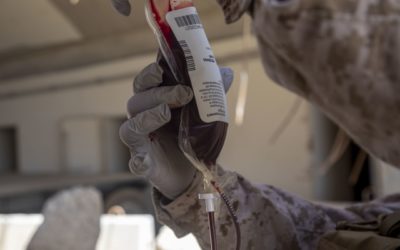For the first time, new research findings have suggested that veterans exposed to Agent Orange might be at increased risk of developing progressive blood cancers, such as myeloproliferative neoplasms (MPNs).
Early Surgical Intervention, Blood Product Use in Battlefield Casualties
In planning and preparing for the future possibility of large-scale combat operations, military medicine might have to decide which wounded warriors can have delayed evacuations. One issue is the need for blood products.
Repository Offers Clues About Young Adult Classical HL
Immune abnormalities persist in young adult classical Hodgkin lymphoma (YAcHL) patients long after cure. Yet, new research presented at the most recent Annual ASH Meeting and Exposition in New Orleans pointed out the difficulties in assessing whether those issues existed prior to diagnosis.
Elevated Preoperative Glucose Level Linked to Adverse Effects in Hernia Repair
An estimated 1 in 10 Americans and 1 in 4 veterans has diabetes, not only putting them at increased risk for problems such as heart and kidney disease, but also making them more prone to complications such as infection and bleeding following surgery.
Most Servicemembers Hospitalized With Exertional Rhabdomyolysis Have Heat Illness
Most hospitalizations in military servicemembers for exertional rhabdomyolysis, a syndrome of muscle breakdown following exercise, are associated with heat illness and present with lower creatine kinase levels than cases without associated heat illness, according to a recent study.
SCT-Related Deaths Might Be Underestimated in U.S. Military
Sickle cell trait (SCT), a condition in which a person has one abnormal allele of the hemoglobin beta gene, affects an estimated 5.02% of non-Hispanic blacks, 1.08% of Hispanics and 0.1% of whites in the U.S. military.
Achieving Treatment-Free Remission in CML: Best Approaches, Best Candidates
In less than two decades, the advent of targeted therapies transformed chronic myeloid leukemia (CML) from a death sentence with a five-year survival rate of just 22% to a chronic condition with five-year survival exceeding 90%.
VA Research Provides Insight into Quality of Life After Blood, Marrow Transplant
Patients with acute myeloid leukemia (AML) face difficult choices if their cancer recurs. Without treatment, survival is a matter of months.
Hemorrhagic Mortality A Problem for APL Patients
Even though the rate of complete remission of acute promyelocytic leukemia (APL) is currently more than 90% because of the use of all-trans retinoic acid (ATRA) with arsenic trioxide (ATO), hemorrhagic mortality has emerged as the most significant barrier to APL-induced remission, according to a new study.
Clonal Hematopoiesis Does Not Predict Severe COVID-19
COVID-19 cases range dramatically from severity, from asymptomatic to self-limited influenza-like illness to severe respiratory failure or even death.
Pediatric ALL Survivors Have High Follow-Up Screening Rates in MHS
Does universal access to healthcare make any difference in health screening for pediatric acute lymphoblastic leukemia (ALL) survivors?
Beyond SPRINT: Drug Regimen, Systolic Blood Pressure Affect CVD
The landmark Systolic Blood Pressure Intervention Trial (SPRINT) quickly changed the standard treatment of patients at high cardiovascular risk in the U.S.
Fresh Whole Blood Transfusion Improves Outcomes in Military Settings
For much of the history of modern medicine, whole blood was the best—and only—option for patients needing transfusion after surgery or major trauma.
Invasive Fungal Infection Remains a Serious Risk in Acute Myeloid Leukemia
Invasive fungal disease (IFD) is a highly morbid complication in patients with hematologic conditions including acute myeloid leukemia (AML), whose risk is increased due to both the disease itself and the treatments for it.
Pulse Wave Velocity Helps Assess Alzheimer’s Risk Factor
While arterial stiffening is increasingly considered an important risk factor for Alzheimers disease (AD) and related dementias, the mechanisms behind that have been poorly understood.
No Racial Disparity in Multiple Myeloma Treatment at VA
While recent studies have identified a significant and increasing disparity in survival among African American and Caucasian patients diagnosed with multiple myeloma in the United States, that does not appear to be the case at the VA.
Red Blood Cell Changes and Exercise in Veterans with GWI
Some types of altered red blood cells can affect patients’ ability to safely exert themselves. It has been unknown, however, whether that was the case with altered red blood cell (RBC) deformability reported in veterans with Gulf War Illness (GWI).
Promising Treatments Boost Positive Extended Results in HCC
Without treatment, even patients diagnosed with early stage hepatocellular carcinoma (HCC) have a median survival of just over a year. Patients with advanced stage disease at diagnosis will likely see just one change of season.
IBD Drugs Linked to Increased Leukemia Risk
Acute myeloid leukemia (AML) and myelodysplastic syndrome (MDS) are rare myeloid clonal disorders that commonly affect the elderly population and have poor prognosis.
VA Patients With New Anemia Are Under-Evaluated
Anemia occurs frequently, and clinicians often underappreciate its importance, even though up to 10% of adults with incident iron deficiency anemia (IDA) could have gastrointestinal cancer, according to a new study.
Hairy Cell Leukemia Case Suggests Link to Camp Lejeune Contamination
A new report revealed a possible link of industrial solvents or benzene to hematopoietic cancers, specifically hairy cell leukemia.
Statins Reduce Some Lymphomas in Veterans With HIV
Statins appear to have immunomodulatory and anti-inflammatory effects and appear to reduce cancer risk. A new study sought to determine if that also is the case with HIV patients, who experience chronic inflammation and immune activation.
AML Prognosis Improved With Promising Therapy Combinations
HOUSTON—The prognosis for older patients with acute myeloid leukemia (AML) has remained dismal, even after treatment with a hypomethylating agent. Standard curative treatment for AML, which is primarily a disease of older adults with a median age of 68 years at...
BH3 Mimetics Combos Targeting MCL1, BCL2 Might Help Treat Melanoma
AURORA, CO – Patients with melanoma who are refractory to or ineligible for immune checkpoint blockade have an urgent need for effective treatments. A report in the journal Cancers (Basel) noted that includes patients who lack BRAF-V600E/K mutations and is often the...
Prognosis Beginning to Improve for T-cell Lymphoma Patients
LONG BEACH, CA – Among hematological malignancies, T-cell lymphomas have an extremely poor prognosis. A new review suggested that might be changing with unusual paths to cure. An article in the Lancet Haematology pointed out that, over the last three decades, little...
Discovery Explains Neurotoxicity With Certain CAR T Cell Immunotherapy
PHILADELPHIA — A new discovery might help explain the cause of neurotoxicity in patients undergoing CD19 directed CAR T cell immunotherapy. A report in the journal Cell discussed how new research uncovered the previously unknown presence of CD19 — a B cell molecule...
Maintenance Rituximab An Option in Some Follicular Lymphoma Cases
SALT LAKE CITY, UT – Since the release of the National LymphoCare Study nearly 10 years ago, few studies have described real-world practice patterns and clinical outcomes in patients with follicular lymphoma, including the use of maintenance rituximab therapy in the...
Humanized Monoclonal Antibodies Show Promise in Relapsed/Refractory CLL
SACRAMENTO, CA – What are the complement depleting effects of humanized monoclonal antibodies and the impact of complement replacement on treatment response in patients with hard-to-treat chronic lymphocytic leukemia? A small phase 2 trial published in the Journal of...
First Line Ibrutinib Delays Time to Next Treatment for Veterans With CLL
HORSHAM, PA -- Chronic lymphocytic leukemia/small lymphocytic lymphoma is the most common adult leukemia, accounting for about 37% of all leukemias in the United States. Yet, a new study suggested that limited real-word evidence is available on the outcomes of...
VA Pharmacists Advise on Use of Anticoagulation in Severe COVID-19 Cases
While reports in the literature are increasing about high rates of coagulopathy and venous thromboembolism (VTE) among hospitalized patients with coronavirus disease 2019 (COVID-19), there is little guidance on how to treat it or prevent it.




